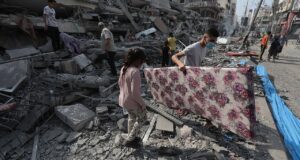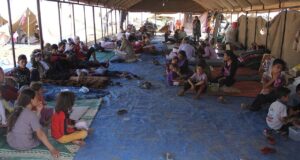By Julie Lenarz
3rd July 2013, Human Rights and Conflict Resolution. Issue 3, No. 1.
Introduction
The crisis in Syria is on-going and so is the debate about the West’s options to help end the bloodshed. Those in favour of a more pro-active policy are regularly confronted with a variety of arguments against intervention. Some of them are perfectly legitimate and rightly point at the potential risks of Western involvement. The validity of others, however, has to be questioned. In the following, four common myths will be addressed.
1) “Syria is primarily a humanitarian crisis”
The humanitarian crisis in Syria is heart-breaking. According to UN figures, 60,000 people have died since March 2011 and the actual number is likely to be much higher. Thousands are fleeing the violence across the border every day – 84,000 in December 2012 alone – bringing the total number of those displaced to around half a million.
However, as much as Syria is a humanitarian catastrophe, it is also a geo-political, strategic crisis.
Syria is not an isolated case like, for instance, Libya. It is central to holding together the Middle East, as it touches upon various, complex interests. Due to the sectarian nature of the conflict, the spill-over effects into other countries are severe.
Turkey is not only subject to repeated border violations but watches the mobilisation of Kurdish forces in northeast Syria with sheer horror. A sharp increase of terrorist attacks can be witness in Iraq with al-Qaeda exploiting the conflict to regain momentum. Baghdad, like Turkey, is equally concerned about the Kurdish factor. So far, the number of Kurds fleeing into Iraq has been relatively small but if they were to unite, they could shift the balance of power in the country and put pressure on the Turkish government.
Meanwhile, Iran is actively supporting the Assad regime and its proxy militia, Lebanese Shia terrorist group Hezbollah, is smuggling fighters and weapons into Syria. Syria’s Sunni population, in particular the Islamist fractions among the opposition, are propped up by Saudi Arabia and Qatar.
As such, the brutal conflict is not only pushing Syria into the humanitarian abyss but is destabilising various other countries to a dangerous degree. It is a recipe for a long-term sectarian strife, destruction, and death across the entire region that will make post-war Iraq look simple.
2) “Syria is lost to Islamic extremists”
The Islamist fractions in Syria are powerful and their influence is steadily growing. Among the 13 Islamic extremist groups are al-Qaeda jihadists, such as Jabhat al-Nusra and the al-Tawheed Brigade, as well as Muslim Brotherhood sympathisers. In particular, the northern Syrian town of Aleppo has turned into one of their strongholds and in November 2012, they declared it an independent Islamic state.
The Islamists, however, were not the ones who triggered the revolution, though they profited immensely from it. How did they manage to hijack the cause?
On the one hand, the Islamic rebels are supported by Saudi Arabia and Qatar, but even more importantly the moderates have been considerably weakened by the lack of outside support. As one Syrian man stated, he can understand why people turn to the extremists and shout “Allahu akbar”. “Who else has helped us?” he asks. “No one.”
While the post-Assad era is likely to be violent and chaotic, it is not too late to fix some of the damage caused.
Western help can counteract the rise of extremist ideologies. The US-led intervention in Kosovo has pushed back the spread of such ideologies, which are likely to emerge in situations of war and despair, and effectively manifested pro-Western attitudes among the predominantly Muslim population.
Assad has not fallen yet and there is still opportunity to influence, at least to a certain extent, the direction the country will take. When the time for making decisions comes, there is a strong argument for the West’s need to be in that room, rather than outside.
3) “Assad is the guardian of minorities”
A common argument in favour of Assad’s reign is that Syria’s religious minorities have so far enjoyed relative freedom and protection in the country.
It is true that most Christians and Alawites stick with Assad, an autocratic, but secular leader as they fear revenge attacks and religious oppression. They are not giving the Syrian opposition the benefit of the doubt, after what happened in Iraq, Egypt, and Lebanon.
A Christian man from Syria expressed the dilemma vividly: “If the regime goes, you can forget about Christians in Syria. […] Look what happened to the Christians of Iraq. They had to flee everywhere, while most of the churches were attacked and bombed.”
In contrast, another ethnic minority has long suffered oppression under Assad and his predecessors. The Kurds are the second largest minority in Syria and were among the first to rise up against Assad in 2004. Since then, they have engaged in anti-Assad protests and many have joined the Free Syrian Army. Nevertheless, there is also doubt among the Kurdish people about their perspectives under a new regime: “Maybe things will be worse for us.”
However, Assad is not the only source of stability and security available to Syria’s Kurds, Christians and Alawites, Druze and Ismaelites. The Syrian Support Group has developed a detailed transitional-justice plan with considerable security-guarantees to stem the danger of post-Assad sectarian violence and lawlessness in rural regions.
As a part of the plan, the Syrian opposition wants to employ carrots and sticks, like partial or full amnesty, to motivate former Assad officials to defect and initiate the process of his fall. Moreover, safe-passage will be guaranteed to Alawites who are not in Assad’s inner circle. In addition, there will also be a fund to compensate war victims and their families.
The plan was developed by a London-based legal firm called McCue & Partners, which is advising the Syrian Support Group. Hopes are that the plan will gain international support at the next Friends of Syria meeting in Italy. Washington Post journalist David Ignatius even went so far as to call the plan “the best idea advanced so far by the Syrian rebels”.
4) “There are no effective military strategies available”
“There is nothing we can do” has become the favourite mantra of the opponents of potential military intervention in Syria. The truth is that we have various options at our disposal, short of a full-scale invasion.
Firstly, we should consider arming the moderate fractions among the opposition. While such undertaking is not without risk, it is indefensible that right now everyone is receiving support but the people that are Syria’s only hope for a brighter future.
Secondly, the Patriots stationed along the Turkish-Syrian border provide us with a unique opportunity to establish a partial No-Fly-Zone. Given that Assad is increasingly killing from the air, the casualty number could be significantly reduced. Once such a zone is created and upheld, humanitarian corridors to address the civilian suffering could be established.
Contrary to what opponents of military intervention claim, Assad’s army is not nearly as strong as perceived and his capabilities greatly exaggerated. Syria’s military forces are better equipped than those of Libya under Gaddafi but the average standard of military efficiency in the Middle East, is relatively low, especially in countries where most weaponry consists of outdated Soviet-era purchases. The number of ground troops are not higher than 100,000, the navy fleet is limited in scope, the air force lacks regular maintenance and Assad has failed to get hold of 60% of his ill-trained reserves.
Thirdly, Syria is not Iraq. Not even the strongest supporters of military intervention, like Republican Senator John McCain, suggest putting boots on the ground. Furthermore, in the case of Iraq a relatively small group of defected intellectuals called for military intervention but in Syria, the animosity against the West is growing precisely because of a lack of action.
Syria, like Libya, has never been a traditional ally of us. But as a Gallup poll in the post-Gaddafi era has shown, Libyans now like Americans more than Canada and several European countries. Maybe it is time to see the revolution in Syria not only as a threat, which it clearly is, but also as an opportunity. But to turn the uprising into something more positive, it is not enough to remain on the side-line and watch as the chaos unfolds.
—————————————————-
– by Edisa Korugic and Julie Lenarz
Julie Lenarz is contactable at:
Julie.Lenarz@hscentre.org
Please cite this article as:
Lenarz, J., Korugic, E. (2013) ‘Syria: Should the West be more Proactive?’. Human Security Centre, Human Rights and Conflict Resolution, Issue 3, No. 1.
 Human Security Centre Human Rights and International Security Research
Human Security Centre Human Rights and International Security Research



